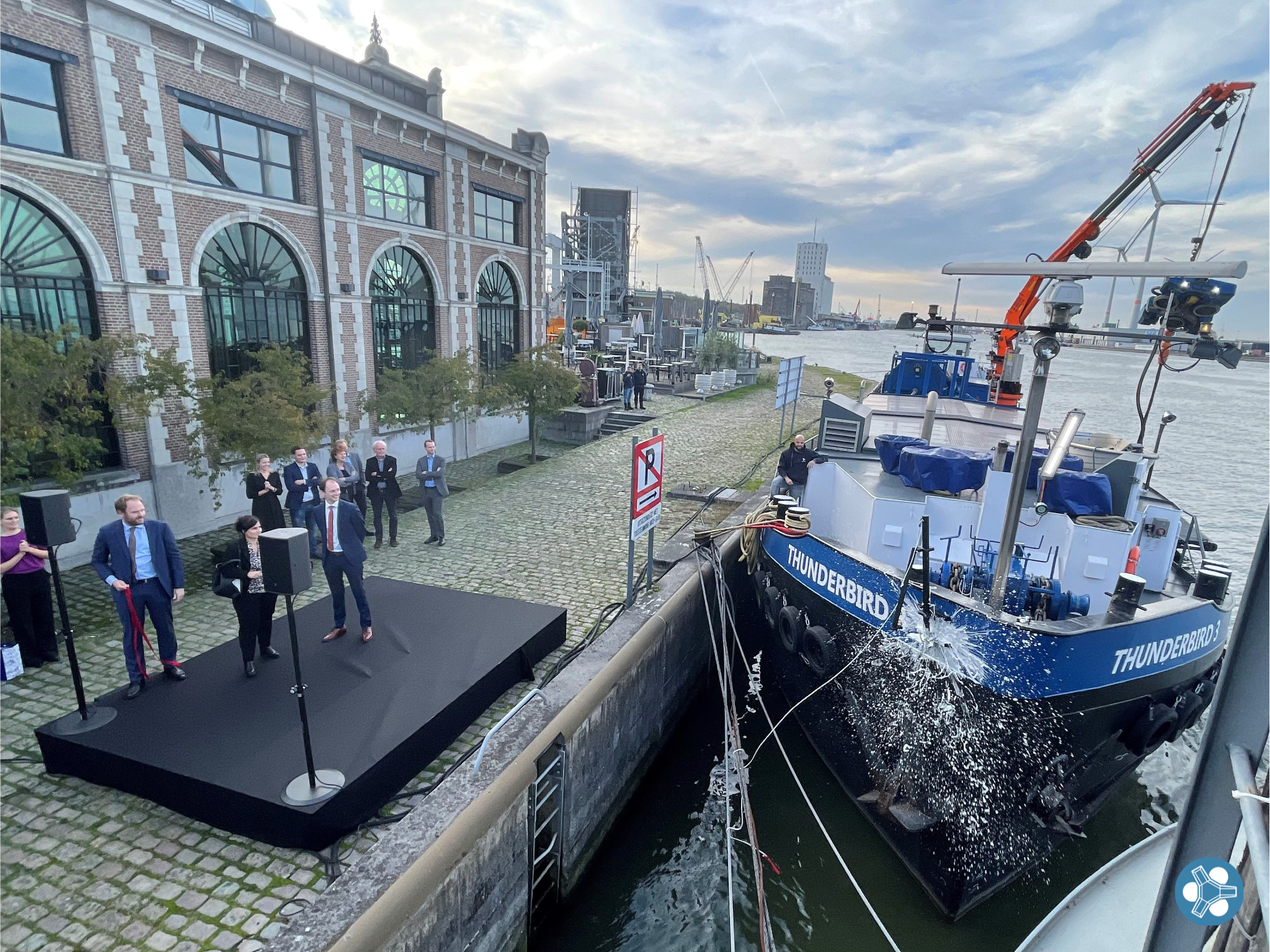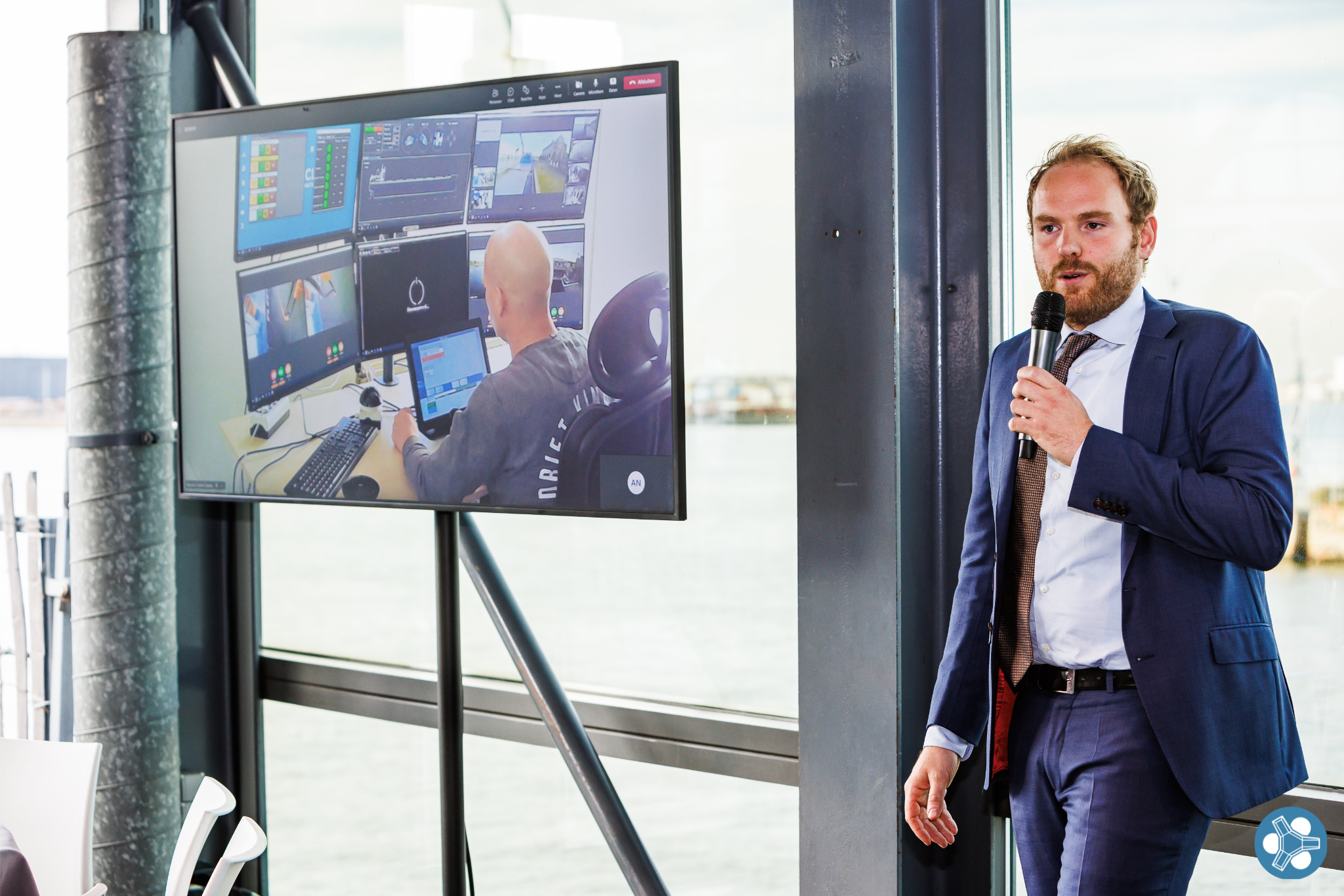Fleet Cleaner demonstrates remote control of hull cleaning services
Thunderbird 3 named as latest vessel in growing fleet as remote operating control centre in Delft begins operations.
As hull biofouling and its role in invasive species transfer and carbon emissions due to increased fuel use continue to attract the attention of the IMO and national regulators, Netherlands-based Fleet Cleaner has added to its armoury with the introduction of a third specialist hull cleaning vessel. In addition, the company has unveiled a new remotely controlled operation service for its growing fleet of vessels and ROV cleaning craft.
Thunderbird 3, a converted former inland general cargo craft, was christened in a ceremony in Antwerp 19 October by Marianna Mastellone, new building project manager and energy manager at MSC Sorrento, a ship management arm of MSC Mediterranean Shipping Company. The naming ceremony was attended by more than 150 guests who were given a tour of the vessel and a demonstration of the remote operating control room in Delft.
“MSC was one of the first companies giving us the opportunity to prove our technology. It’s an honour to have them christen our new vessel and also have them as a valued customer, along with our other customers and stakeholders who are working to improve the sustainability of the industry and oceans,” said Cornelis de Vet, co-founder and COO of Fleet Cleaner.
“It is a great honour to christen and be godmother of the Thunderbird 3. The hull cleaning and inspection vessel with its remotely controlled operation service is a testament to the dedication and foresight of the Fleet Cleaner company. We at MSC are always looking for innovations that can help improve efficiency through the water and, therefore, help us to minimize fuel consumption. Fleet Cleaner with its new vessel can help us as we continue to strive towards our goal of net zero decarbonization. We wish Thunderbird 3 fairwinds and following seas, may god bless the ship, the crew and all voyages to come,” said Marianna Mastellone of MSC.
The whole vessel including its engine room at the aft and equipment on deck is all ATEX certified so there is no risk of explosion when carrying out operations thus making it suitable for cleaning all ship types during cargo operations at terminals, including tankers. The vessel also has large fenders to allow for sufficient clearance of the ship to be cleaned for safety purposes. The vessel is able to clean up to 150 ships a year and Fleet Cleaner calculates emissions are reduced significantly, equivalent to that from around 200.000 cars a year.
The hydraulically powered ROV is also ATEX certified. It is attached to the vessel using magnets and has an umbilical connection to Thunderbird 3 through which filtered seawater is pumped to the ROV for use as a pressurised cleaning medium. The pressure can be adjusted according to the degree of fouling and the types of coatings used. The cleaning heads are flexible and can move in all directions so the ROV can be used with confidence on different ship types.
The ROV has various aids to help the operator with cleaning and inspection, including lights, cameras front and back, and various sensors that helps the operator navigate over the hull surface. It can cover up to 2,000m2/hr and is designed for 50m underwater operation.
All removed fouling is collected and transported via the umbilical back to Thunderbird 3 where it is filtered and stored onboard or transported by barge if the job is a large one. The cleaned filtered water can be released back into the port.
Before commissioning the Delft remote centre, Fleet Cleaner’s ROV’s needed to be controlled and operated from the vessels themselves but now operators can continue to work around the clock and the number of crew on the vessels can be reduced. To aid the remote operator, specialised software is used to load the hull drawings of the ship so that the cleaning process is better planned and controlled.
As Alex Noordstrand CEO and co-founder of Fleet Cleaner explained, “We now have dedicated, highly skilled operators working in the control centre, sailors on the vessels and we also have service engineers. So, we no longer have all-rounders doing all the jobs, we now have work specialisations to enable our remote hull cleaning and inspections services,” and added, “The remote operation is an essential step for further automation that will increase production and grow our operations sustainably. Working remotely is the future.”
Fleet Cleaner’s operations and methods have been approved by authorities in the Netherlands and Belgium and the company is looking to expand. It has recently inspected two further vessels that may very well become Thunderbird 4 and Thunderbird 5. By the end of this year, it expects to be performing daily inspections in seven countries around the world and have grown its operations to meet increasing customer and market demands.
Commenting on the sidelines of the christening event, Jasper Cornelis, Port of Antwerp-Bruges said: We are supportive to give innovative companies like Fleet Cleaner a chance to offer a robust solution to the fouling problem that has been troubling shipping for ages. They and other innovative companies can support green ports and take action to help address the fouling problem.”
Ron van Gelder, Port of Rotterdam commented, “Our primary interest is getting vessels in and out without problems. If a vessel is held up because of fouling issues, then that’s not good for the ports and of course our waters. As we see it, in-water hull cleaning with capture plays an extremely important role to help avoid such problems and Fleet Cleaner offers effective and reliable services.”
Anders Wulff, head of continent/Med operations at Ultrabulk added: “The time used to do the in-water hull cleaning and the quality of the service provided are two important factors for us when choosing a company to clean our ship hulls. With Fleet Cleaner’s service we get our hulls cleaned during loading and discharging operations, so we save time, and the hulls are cleaned effectively and without damaging the antifouling so there are economical and environmental benefits. This is becoming even more important with high fuel costs and upcoming stricter regulations in mind.”


